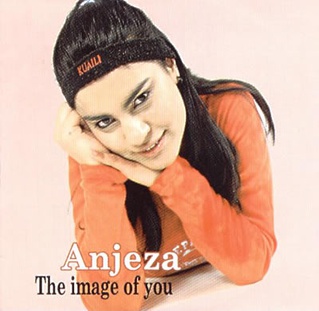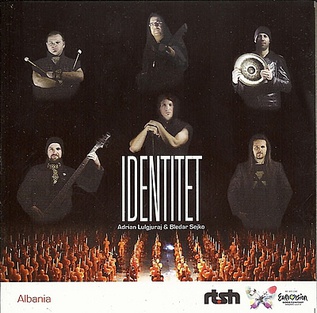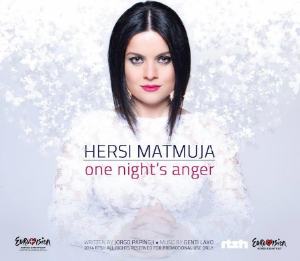Zjerm ("fire" in Albanian, definite form zjermi) may refer to:
- Zjerm (Albanian paganism), fire in Albanian tradition
- Zjerm (song), a song by the Albanian duo Shkodra Elektronike
- Zjermi (The Twins), the twin protagonist of an Albanian folk tale
Zjerm ("fire" in Albanian, definite form zjermi) may refer to:
Part Two, Part 2 or Part II may refer to:

Laura Palmer is a fictional character in the Twin Peaks franchise and the primary focus of the series. She is portrayed by Sheryl Lee and was created by the series creators David Lynch and Mark Frost. She first appears in the ABC original series Twin Peaks. A high school student whose death is the catalyst for the events of the series, Palmer is the protagonist in Lynch's prequel film Twin Peaks: Fire Walk with Me (1992), which depicts the final week of her life leading up to her murder. Laura also appears in the novels, Twin Peaks: The Return (2017), and a variety of merchandise based on the series.

Albania has participated in the Eurovision Song Contest 20 times since its debut in 2004. The current Albanian participating broadcaster in the contest is Radio Televizioni Shqiptar (RTSH), which determines the country's entry every year through the national selection of Festivali i Këngës, a long-standing song competition organised yearly since 1962.

"The Image of You" is a song by Albanian singer Anjeza Shahini. The song was composed by Edmond Zhulali and written by Agim Doçi. Radio Televizioni Shqiptar (RTSH) released it as a CD single in 2004. A rhythmic English-language electropop ballad, the song lyrically explores a woman's emotions in what appears to be a whirlwind romance. "The Image of You" represented Albania in the Eurovision Song Contest 2004 in Istanbul, Turkey, after Shahini won the national selection competition, Festivali i Këngës 42, with the song's Albanian-language version "Dua të jem imazhi yt". The country attempted its debut in the contest and reached the 7th place in a field of 24, receiving a total of 106 points. During her minimalistic show of the song, Shahini was accompanied on stage by four backing vocalists.

"Zjarr e ftohtë" is a song by Albanian singer Luiz Ejlli. Klodian Qafoku composed the music while Florian Kondi wrote the lyrics. Musically, it is an Albanian-language pop song incorporating a southern Albanian folklore element in its instrumentation. The song represented Albania in the Eurovision Song Contest 2006 in Athens, Greece, after winning the pre-selection competition Festivali i Këngës 44. The country failed to qualify for the grand final in fourteenth place, marking the country's first non-qualification in the contest.

Albanian paganism comprises the pagan customs, beliefs, rituals, myths and legends of the Albanian people. The elements of Albanian mythology are of ancient Paleo-Balkanic origin and almost all of them are pagan. Ancient paganism persisted among Albanians, and especially within the inaccessible and deep interior – where Albanian folklore evolved over the centuries in a relatively isolated tribal culture and society – it has continued to persist, or at most it was partially transformed by the Christian, Muslim and Marxist beliefs that were either to be introduced by choice or imposed by force. The Albanian traditional customary law (Kanun) has held a sacred – although secular – longstanding, unwavering and unchallenged authority with a cross-religious effectiveness over the Albanians, which is attributed to an earlier pagan code common to all the Albanian tribes. Indeed, the Kanun contains several customary concepts that clearly have their origins in pagan beliefs, including in particular the ancestor worship, animism and totemism, which have been preserved since pre-Christian times. Albanian traditions have been orally transmitted – through memory systems that have survived intact into modern times – down the generations and are still very much alive in the mountainous regions of Albania, Kosovo and western North Macedonia, as well as among the Arbëreshë in Italy and the Arvanites in Greece, and the Arbanasi in Croatia.

"Hear My Plea" is a song by Albanian singer and songwriter Frederik Ndoci. It was issued as part of a CD compilation on 20 April 2007 by CMC Records. The English-language song was written by Pandi Laço and composed by Adrian Hila. "Hear My Plea" represented Albania in the Eurovision Song Contest 2007 in Helsinki, Finland, after Ndoci won the pre-selection competition, Festivali i Këngës 45, with the song's Albanian-language version "Balada e Gurit". The country failed to qualify for the grand final in 17th place, marking its second non-qualification in the contest. During his dark-themed show of the song, Ndoci was accompanied by an instrumentalist and four backing vocalists. An accompanying music video for the song premiered on the official YouTube channel of the Eurovision Song Contest on 5 April 2007.
The drangùe is a semi-human winged divine hero in Albanian pagan mythology, associated with weather and storms. He is the archetype of light and good, the complementary and opposing force to kulshedra, the archetype of darkness and evil. Babies destined to become drangue are born with their heads covered in caul and with two or sometimes four wings under their arms. The drangue hold supernatural powers, especially in the wings and arms. A drangùe is made invulnerable by the singular conjunction produced at his birth, and can die only if this conjunction is repeated once again.
Twins are two offspring produced in the same pregnancy.

"Feel the Passion" is a song by Albanian singer Aurela Gaçe. It was issued as a CD single on 15 April 2011 by EMI. The English-language pop and rock song was composed by Shpëtim Saraçi and written by Sokol Marsi. An accompanying music video premiered on the official YouTube channel of the Eurovision Song Contest on 16 March 2011. The song represented Albania in the Eurovision Song Contest 2011 in Düsseldorf, Germany, after Gaçe won the pre-selection competition Festivali i Këngës with the Albanian-language version "Kënga ime". It failed to qualify for the grand final in fourteenth place marking the country's third non-qualification in the contest. During her show, Gaçe was accompanied by three backing vocalists and two instrumentalists, while the Albanian theme was visually amplified by the wings of a white and red coloured eagle on the LED screens.

Bleona Qereti, known mononymously as Bleona, is an Albanian and American singer, songwriter, actress, entrepreneur, model and television personality.

Enji is the old name of the fire god in the Albanian pagan mythology evidently contained in the week day name that was dedicated to him – e enjte – the Albanian word for Thursday. The Fire – Zjarri – is deified in Albanian tradition as releaser of light and heat with the power to ward off darkness and evil, affect cosmic phenomena and give strength to the Sun, and as sustainer of the continuity between life and afterlife and between the generations. The divine power of Fire is used for the hearth and the rituals, including calendar fires, sacrificial offerings, divination, purification, and protection from big storms and other potentially harmful events. Fire worship and rituals are associated with the cult of the Sun (Dielli), the cult of the hearth (vatër) and the ancestor, and the cult of fertility in agriculture and animal husbandry. Fire rituals that are commonly found among Indo-European peoples, including the Albanians, have been firstly attested by the Vedas, with hymns dedicated to the fire god Agni. Described in written sources since 1482, the Albanian fire rituals have been historically fought by the Christian clergy, without success. The cult of the mystic fire and the fire ritual practices have played a prominent role in the lives of all the Albanian people until the 20th century, and in rural areas they continue to be important for Albanian traditional customs even in the present days.

"Identitet" is a song by Albanian singers Adrian Lulgjuraj and Bledar Sejko. It was first released on 12 March 2013 as a music video release which was uploaded on the official YouTube channel of the Eurovision Song Contest, then it was released as a single as part of a CD compilation on 29 April 2013 by Universal Music. The Albanian-language folk-inspired heavy rock song was composed by Bledar Sejko and the lyrics were written by Eda Sejko.

"One Night's Anger" is a song by Albanian singer Hersi Matmuja. The track was first released as part of a CD compilation on 11 April 2014 by CMC Records and Universal Music. The English-language rock song was written by Jorgo Papingji and composed by Gentian Lako. An accompanying music video was uploaded on the official YouTube channel of the Eurovision Song Contest on 16 March 2014. The song received mixed reviews from music critics, some of whom praised the singer's vocals, while others described it as a "work-in-progress".

The vatër is the domestic hearth in Albanian culture. The fire of the domestic hearth holds divine attributes in Albanian beliefs, being considered the sustainer of the continuity between the world of the living and that of the dead, and ensuring the continuity of the tribe from generation to generation. The absence of fire in a house is traditionally considered a great curse. In Albanian folk beliefs the fire hearth is the symbol of fire as the offspring of the Sun (Dielli). In Albanian tradition the deified fire (zjarri) was evidently also called with the theonym Enji, the god to whom Thursday – e enjte – was dedicated in the Albanian language.
"The Twins" is an Albanian folk tale firstly recorded by Arbëreshë folklorist Giuseppe Schirò in Piana degli Albanesi and published in his 1923 book, Canti tradizionali ed altri saggi delle colonie albanesi di Sicilia, in Albanian and Italian. American journalist George Post Wheeler published an English translation of a similar tale from Albania in his 1936 book, Albanian Wonder Tales, entitling his version "The Boy who was Brother to the Drague", with the same twin protagonists but also including a drangue as a blood brother of one of the twins.

Dielli, the Sun, holds the primary role in Albanian pagan customs, beliefs, rituals, myths, and legends. Albanian major traditional festivities and calendar rites are based on the Sun, worshiped as the god of light, sky and weather, giver of life, health and energy, and all-seeing eye. In Albanian tradition the fire – zjarri, evidently also called with the theonym Enji – worship and rituals are particularly related to the cult of the Sun. Ritual calendar fires or bonfires are traditionally kindled before sunrise in order to give strength to the Sun and to ward off evil. Many rituals are practiced before and during sunrise, honoring this moment of the day as it is believed to give energy and health to the body. As the wide set of cultic traditions dedicated to him indicates, the Albanian Sun-god appears to be an expression of the Proto-Indo-European Sky-god.

Festivali i Këngës 63 was the 63rd edition of the annual Albanian music competition Festivali i Këngës, organised by Radio Televizioni Shqiptar (RTSH). It was held between 19 and 22 December 2024 at the Palace of Congresses in Tirana, and it was hosted by Enkel Demi and Ornela Bregu. The winner was Shkodra Elektronike with "Zjerm", therefore becoming the contestant that will represent Albania in the Eurovision Song Contest 2025.

"Zjerm" is a song performed by the Albanian duo Shkodra Elektronike. It was written by Beatriçe Gjergji and Lekë Gjeloshi, with production handled by Kolë Laca. The song will represent Albania in the Eurovision Song Contest 2025.
Shkodra Elektronike is an Albanian folktronica duo formed in 2019 in Shkodër consisting of Kolë Laca and Beatriçe Gjergji. They will represent Albania at the Eurovision Song Contest in 2025 with the song "Zjerm".